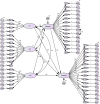Knowledge, Attitudes and Practices Towards Psoriasis Among Patients and Their Family Members
- PMID: 38586181
- PMCID: PMC10999187
- DOI: 10.2147/CCID.S454798
Knowledge, Attitudes and Practices Towards Psoriasis Among Patients and Their Family Members
Abstract
Purpose: KAP studies serve to enhance health consciousness and furnish foundational data for appraising, strategizing, and enacting disease management and prejudice eradication initiatives. There remains a dearth of published studies elucidating the dimensions of knowledge, attitudes, and practices among psoriasis patients in China. To investigate the knowledge, attitudes and practices (KAP) towards psoriasis among patients and their family members in Northern China.
Methods: This web-based, cross-sectional study was conducted among psoriasis patients and their family members through a self-administered questionnaire.
Results: Among patients (n=260), their mean KAP scores were 9.76±5.69 (range: 0-19), 35.64±11.48 (range: 14-70), and 56.73±10.98 (range: 16-80), respectively. Among family members (n=237), their mean KAP scores were 11.93±5.34 (range: 0-19), 35.80±4.34 (range: 8-40), and 37.04±4.38 (range: 8-40), respectively. Structural equation modeling (SEM) analysis for patients indicated significant and negative path relations between knowledge and attitudes (β=-2.271, P<0.001), and between knowledge and practice (β=-0.398, P<0.001). Extended SEM analysis, which divides knowledge into K1, K2, and K3 parts, showed negative path relations between K3 and attitude (β=-1.300, P=0.002), between attitude and practice (β=-0.634, P<0.001). Moreover, SEM for family members showed positive path relations between knowledge and attitude (β=1.536, P<0.001), between attitude and practice (β=0.682, P<0.001).
Conclusion: Patients in Northern China demonstrated insufficient knowledge, negative attitude, and proactive practice, while their family members had insufficient knowledge, positive attitude, and proactive practice toward psoriasis. It is recommended to implement educational interventions addressing knowledge gaps among patients and families.
Keywords: attitude; cross-sectional study; knowledge; patients and family members; practice; psoriasis; questionnaire.
© 2024 Zhang et al.
Conflict of interest statement
The author(s) report no conflicts of interest in this work.
Figures
Similar articles
-
Knowledge, attitude, and practice of psoriasis patients toward their diseases: a web-based, cross-sectional study.Front Med (Lausanne). 2024 Apr 10;11:1288423. doi: 10.3389/fmed.2024.1288423. eCollection 2024. Front Med (Lausanne). 2024. PMID: 38660417 Free PMC article.
-
Knowledge, attitude, and practice of stroke patients' family members towards stroke rehabilitation: A cross-sectional study.J Stroke Cerebrovasc Dis. 2025 Feb;34(2):108177. doi: 10.1016/j.jstrokecerebrovasdis.2024.108177. Epub 2024 Dec 5. J Stroke Cerebrovasc Dis. 2025. PMID: 39645175
-
Knowledge, attitudes and practices of patients with chronic pharyngitis toward laryngopharyngeal reflux in Suzhou, China.BMC Public Health. 2023 Dec 19;23(1):2542. doi: 10.1186/s12889-023-17463-0. BMC Public Health. 2023. PMID: 38115020 Free PMC article.
-
Knowledge, attitudes, and practices among medical students toward depression management: a cross-sectional study in China.Front Public Health. 2024 Oct 7;12:1429943. doi: 10.3389/fpubh.2024.1429943. eCollection 2024. Front Public Health. 2024. PMID: 39435403 Free PMC article.
-
Knowledge, attitudes and practices among patients with end-stage kidney disease towards hyperkalaemia management in Shenzhen, China: a cross-sectional study.BMJ Open. 2025 Mar 22;15(3):e092619. doi: 10.1136/bmjopen-2024-092619. BMJ Open. 2025. PMID: 40122543 Free PMC article.
Cited by
-
Family Members' Perspectives on Integrative Chinese-Western Medicine in Cancer Care.J Multidiscip Healthc. 2025 Apr 28;18:2361-2373. doi: 10.2147/JMDH.S509065. eCollection 2025. J Multidiscip Healthc. 2025. PMID: 40321884 Free PMC article.
References
LinkOut - more resources
Full Text Sources





